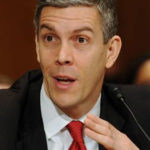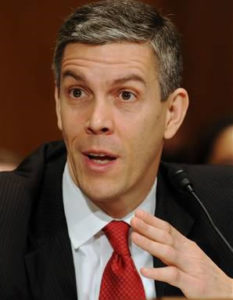
Responding to private lenders’ lobbying efforts against White House plans for direct federal loans, Education Secretary Arne Duncan said Feb. 17 that he trusts the U.S. Senate will pass the Student Aid and Fiscal Responsibility Act (SAFRA) and “end this boondoggle for banks.”
Five months after the U.S. House of Representatives passed SAFRA, senators have not voted on the bill, while private lending companies have organized town-hall style meetings and aired television ads opposing the bill in several states.
In an afternoon conference call with reporters on Feb. 17, Duncan emphasized that there isn’t a “drop dead date” for passage of the direct-lending legislation, and he promised that education officials are “in this for the long haul.”
“The banking industry has had a free ride for too long,” Duncan said. “Now, the banks are lobbying Congress to protect their scheme.”
He continued: “To me, it’s a simple choice: Subsidize banks or invest in children.”
Duncan has led the charge in the Obama administration’s proposal to have student loans come directly from the federal government, saving taxpayers a reported $87 billion over 10 years by doing away with subsidies given to private lenders, who then loan students money with interest tacked on.
Advocates for direct federal loans contend that the policy shift would insulate student aid from dramatic market swings that can increase interest rates and decrease the availability of loans. The economic downturn has seen more than 30 private lending companies stop offering student loans.
Duncan refuted the lending industry charge that a direct federal loan program would cost tens of thousands of jobs in a slumping economy. He said lenders who would work with the government to distribute loans would hire Americans, because SAFRA would require lending companies to be based in the U.S.
Duncan said during the conference call that private lenders have begun airing TV commercials opposing direct lending in four states.
And with the direct-lending legislation stalled in the Senate, private lenders have bolstered their lobbying efforts. Sallie Mae, the country’s largest provider of student loans, spent about $3.5 million in lobbying efforts last year, an increase from $3.2 million in 2008, according to the Center for Responsive Politics, a national research group that tracks trends in lobbying.
Education lobbying totals dipped overall in 2009, to $98.6 million, down from $105.5 million in 2008, according to the center.
Duncan sent a letter to 3,500 colleges and universities last October urging them to “ensure uninterrupted access to federal student loans by ensuring your institution is direct loan-ready for the 2010-2011 academic year.” Since then, more college leaders have moved to a direct-lending model.
The letter drew fire from some colleges and members of Congress, however. Sen. Mike Johanns, a Nebraska Republican, said in a letter to Duncan that he had unfairly pressured colleges into switching to direct lending before the Senate had taken a close look at the proposed law.
“As a strong supporter of competition, I am disappointed in your actions to encourage this conversion when legislation has not yet become law,” Johanns said in the Nov. 3 letter. “Nebraska students and their families benefit from competition among student loan providers. That is why I strongly believe in the availability of private student loans and why Congress should make these decisions, not the administration.”
Johanns described ED’s move toward direct lending as a “hostile takeover of the student loan business.”
Sen. Lamar Alexander, R-Tenn., also protested Duncan’s letter to colleges last fall, calling the decision “premature.” Alexander said he was concerned that colleges and universities lacked the resources to handle the shift from private to federal loans.
Even Democrats have criticized the administration’s direct lending push. Sen. Evan Bayh, D-Ind., who announced Feb. 15 that he would not run for re-election this year, sent a letter to Senate Health, Education, Labor and Pensions Committee Chairman Tom Harkin on Wednesday saying SAFRA would threaten jobs in Indiana.
Sallie Mae operates offices in several Indiana towns and cities, and Bayh said switching to 100 percent federal student loans, while creating jobs in the long term, would hurt the state’s economy in the short term.
Making college affordable for low-and-middle income students is a priority for lawmakers, but “so is both creating new jobs and protecting those we have,” Bayh said in his letter.
Duncan said there are more than 2,300 campuses that offer direct lending, up from 1,000 in 2007.
Northwestern University is one of the latest schools to convert to direct lending. A Feb. 14 announcement said the move was in response to the slumping economy and impending changes in the way students receive college loans.
Northwestern said in its announcement this week that campus officials already were familiar with the software necessary for shifting to direct federal loans.
“Our knowledge of this software will ensure no disruption in the processing or the receipt of your loan funds for the 2010-11 year,” the university said in a message to students.
“We’ve seen this huge migration [away from private lending] over the past three years,” Duncan said during the conference call. “I think the choice is very, very clear.”
Links:
Northwestern University announcement
- Research: Social media has negative impact on academic performance - April 2, 2020
- Number 1: Social media has negative impact on academic performance - December 31, 2014
- 6 reasons campus networks must change - September 30, 2014
